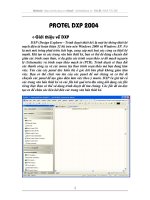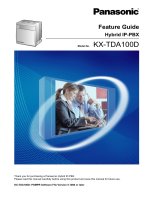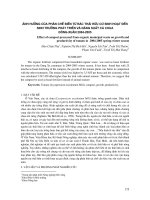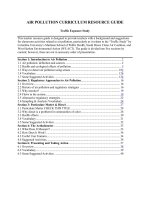55 CUPM Curriculum Guide 2004
Bạn đang xem bản rút gọn của tài liệu. Xem và tải ngay bản đầy đủ của tài liệu tại đây (1.32 MB, 31 trang )
Undergraduate Programs and Courses in
the Mathematical Sciences:
CUPM Curriculum Guide 2004
This is the first CUPM report to address the entire
undergraduate mathematics curriculum, for all students.
It is the result of four years of work including extensive
consultation with hundreds of mathematicians as well as
faculty from biology, chemistry, economics, engineering
and other partner disciplines.
Supported by grants from NSF and the
Calculus Consortium for Higher Education
The Mathematical Association of America
Historical Background to the Guide
Committee on the Undergraduate
Program in Mathematics (CUPM)
established in 1953 (as CUP).
Curriculum guidelines published in 1965
with update in 1972 described the
program needed to prepare for
doctoral study
The Mathematical Association of America
1981 Recommendations for a General
Mathematical Sciences Program
(republished in Reshaping College
Mathematics)
1970
~23,000 majors
1980
~12,000 majors
Alan Tucker, Chair
The Mathematical Association of America
1981 Recommendations for a General
Mathematical Sciences Program
(republished in Reshaping College
Mathematics)
•Meet needs of average students
•Emphasize development of reasoning skills
•Interactive teaching, guide students
•Use applications to illustrate and motivate
•Introductory courses should appeal to a
broad audience
The Mathematical Association of America
1981 Recommendations for a General
Mathematical Sciences Program
(republished in Reshaping College
Mathematics)
All majors should take
•Statistics
•Discrete Mathematics
•Modeling
•A 2-course upper division sequence
The Mathematical Association of America
1991 The Undergraduate Major in
the Mathematical Sciences (published
in Heeding the Call for Change)
1970
~23,000 majors
1980
~12,000 majors
1990
~13,000 majors
The Mathematical Association of America
Lynn Steen
1991 The Undergraduate Major in
the Mathematical Sciences (published
in Heeding the Call for Change)
Reaffirmed 1981 recommendations, added
•Emphasis on writing, speaking, team work
•Include concentrations in applied mathematics
•Take advantage of technology
•Pay attention to advising
The Mathematical Association of America
2001 Guidelines for Programs
and Departments in
Undergraduate Mathematical
Sciences
Contains statements on planning and periodic review,
faculty and staffing, curriculum and teaching,
institutional and departmental resources, physical
facilities, libraries, and services to students such as
advising and co-curricular activities for majors.
The Mathematical Association of America
Tom Berger
1999 CUPM begins to prepare
for next set of recommendations
Math
Math Ed
Stat
1970
~23,000
1980
~12,000
2,000
600
1990
~13,000
3,000
1000
2000
~11,000
5,000
1100
The Mathematical Association of America
Premise 1: Mathematics is an exciting,
dynamic field that should be recognized
as lying at the core of the entire
undergraduate curriculum.
The Mathematical Association of America
Premise 1: Mathematics is an exciting,
dynamic field that should be recognized
as lying at the core of the entire
undergraduate curriculum.
Premise 2: Excellence is achieved by
focusing on the outcomes we want of our
students and tailoring the program to the
specific needs of our students within the
context of our institution.
The Mathematical Association of America
Preparing for the Guide
– Focus groups at Joint Math Meetings 2000,
2001 & Mathfest 2002—over 500 participants
– Panel discussions at meetings
– Invited papers, September 2000
– Reports from AMS, AMATYC, ASA, NCTM
The Mathematical Association of America
CRAFTY Curriculum
Foundations Project
Susan Ganter, Clemson
Bill Barker, Bowdoin
The Mathematical Association of America
CRAFTY Curriculum
Foundations Project:
Voice of the Partner Disciplines
Biology: “Statistics, modeling and graphical
representation should take priority over calculus.”
The Mathematical Association of America
CRAFTY Curriculum
Foundations Project:
Voice of the Partner Disciplines
Chemistry: “It is desirable that calculus courses
address multivariable problems from the outset.”
“Logical, organized thinking and abstract reasoning are
skills developed in mathematics courses that are
essential for chemistry.”
The Mathematical Association of America
CRAFTY Curriculum
Foundations Project:
Voice of the Partner Disciplines
Physics: “Courses should cover fewer topics and
place increased emphasis on increasing the confidence
and competence [of] students…”
“Conceptual understanding of basic mathematical
principles is very important … It is more important
than esoteric computational skill.”
The Mathematical Association of America
CRAFTY Curriculum
Foundations Project:
Voice of the Partner Disciplines
Business & Management: “When in doubt,
mathematics faculty should cover less material—and
treat the material covered with respect—imparting to
the students a sense of the importance of the
mathematics.”
The Mathematical Association of America
CRAFTY Curriculum
Foundations Project:
Voice of the Partner Disciplines
Electrical Engineering: “The mathematics
required to enable students to achieve these skills
should emphasize concepts and problem-solving skills
more than emphasizing repetitive mechanics of solving
routine problems.”
The Mathematical Association of America
Writing Team for the CUPM Curriculum Guide 2004
Harriet
Pollatsek, chair,
Mt. Holyoke
College
Susanna Epp,
DePaul
University
Bill Barker,
Bowdoin
College
Susan Ganter,
Clemson
University
David Bressoud,
Macalester
College
Bill Haver, Virginia
Commonwealth
University
The Mathematical Association of America
Common themes in CUPM 1981, 1991, 2004
•
•
•
•
•
•
Reasoning and analytical skills
Interplay of applications, problem solving, and theory
Broad, flexible major for diverse student goals
Take advantage of technology
Recruit and nurture majors; good advising
Include data analysis and discrete mathematics in major
The Mathematical Association of America
Common themes in CUPM 1981, 1991, 2004
•
•
•
•
•
•
Reasoning and analytical skills
Interplay of applications, problem solving and theory
Broad, flexible major for diverse student goals
Take advantage of technology
Recruit and nurture majors; good advising
Include data analysis and discrete mathematics in major
The Mathematical Association of America
New themes, CUPM 2004
• Look outward and include non-majors
• Know students, create appropriate goals, evaluate
courses and programs (assessment)
• Emphasize mathematical thinking and communication in
all courses, incremental approach
• Promote interdisciplinary cooperation, joint majors
• Alternative routes to the major
• Provide support for faculty working on these changes
Provide examples of good practice!
The Mathematical Association of America
Six General Recommendations
1. Understand the student population and
evaluate courses and programs.
MAA project Supporting Assessment in
Undergraduate Mathematics
/>Assessment Practices in Undergraduate
Mathematics, Gold et al. 1999
The Mathematical Association of America
Six General Recommendations
2. Develop mathematical thinking and
communication skills.
Mathematics: “The most important task of the first two
years is to move students from a procedural/computational
understanding of mathematics to a broad understanding
encompassing logical reasoning, generalization,
abstraction, and formal proof. The sooner this can be
accomplished, the better.” —Curr. Fdns. Proj.
The Mathematical Association of America
Six General Recommendations
3. Communicate the breadth and
interconnections of the mathematical
sciences.
Consortium for Mathematics and Its Applications
Journal of Online Mathematics and its
Applications
The Mathematical Association of America









